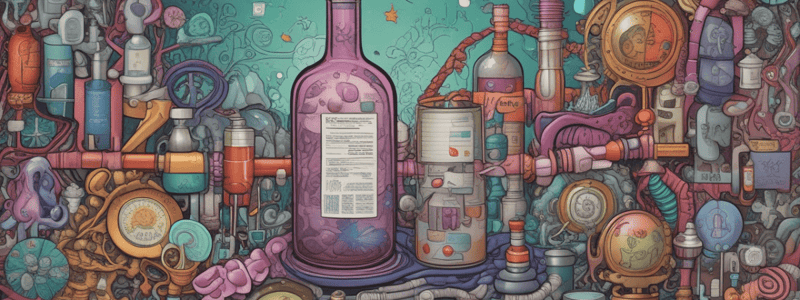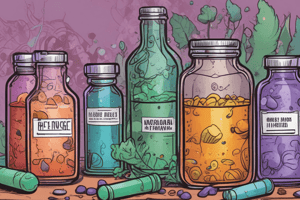Podcast
Questions and Answers
What is Schedule II comprised of?
What is Schedule II comprised of?
- Chemical synthesis substances only
- Controlled substances by official name only
- Drugs and other substances by whatever official name, common or usual name, chemical name, or brand name (correct)
- Vegetable origin substances only
What is excluded from opium and opiate derivatives?
What is excluded from opium and opiate derivatives?
- Apomorphine, dextrorphan, and nalbuphine
- Codeine, ethylmorphine, and etorphine hydrochloride
- Hydrocodone, hydromorphone, and morphine
- Nalmefene, naloxone, and naltrexone (correct)
What is included in Schedule II?
What is included in Schedule II?
- Oxycodone, oxymorphone, and dihydroetorphine (correct)
- Opium extracts, powdered opium, and granulated opium
- Isoquinoline alkaloids of opium
- Decocainized coca leaves or extraction of coca leaves
What is opium poppy and poppy straw classified as?
What is opium poppy and poppy straw classified as?
What is cocaine derived from?
What is cocaine derived from?
What is not included in Schedule II?
What is not included in Schedule II?
What is Schedule II comprised of, in terms of sources?
What is Schedule II comprised of, in terms of sources?
What is an exception to the rule of coca leaves and their derivatives?
What is an exception to the rule of coca leaves and their derivatives?
What is the crude extract of poppy straw in any form, containing phenanthrene alkaloids of the opium poppy?
What is the crude extract of poppy straw in any form, containing phenanthrene alkaloids of the opium poppy?
What is the maximum amount of dihydrocodeinone (hydrocodone) allowed per 100 milliliters or per dosage unit, with a fourfold or greater quantity of an isoquinoline alkaloid of opium?
What is the maximum amount of dihydrocodeinone (hydrocodone) allowed per 100 milliliters or per dosage unit, with a fourfold or greater quantity of an isoquinoline alkaloid of opium?
Which of the following opiates is specifically excepted?
Which of the following opiates is specifically excepted?
What is the name of the substance with the chemical designation (+,-)-trans-3-(1,1-dimethylheptyl)-6, 6a, 7, 8, 10, 10a-hexahydro-1-hydroxy-6, 6-dimethyl-9H-dibenzo{b,d}pyran-9-one?
What is the name of the substance with the chemical designation (+,-)-trans-3-(1,1-dimethylheptyl)-6, 6a, 7, 8, 10, 10a-hexahydro-1-hydroxy-6, 6-dimethyl-9H-dibenzo{b,d}pyran-9-one?
Which of the following stimulants is not listed?
Which of the following stimulants is not listed?
What is the category of substances that have a depressant effect on the central nervous system?
What is the category of substances that have a depressant effect on the central nervous system?
Which of the following is an immediate precursor?
Which of the following is an immediate precursor?
What is the maximum amount of dihydrocodeinone (hydrocodone) allowed per 100 milliliters or per dosage unit, with one or more active non-narcotic ingredients in recognized therapeutic amounts?
What is the maximum amount of dihydrocodeinone (hydrocodone) allowed per 100 milliliters or per dosage unit, with one or more active non-narcotic ingredients in recognized therapeutic amounts?
Which of the following opiates is a hallucinogenic substance?
Which of the following opiates is a hallucinogenic substance?
Which category of substances includes amobarbital, glutethimide, pentobarbital, and secobarbital?
Which category of substances includes amobarbital, glutethimide, pentobarbital, and secobarbital?
What is the chemical name of the immediate precursor to amphetamine and methamphetamine?
What is the chemical name of the immediate precursor to amphetamine and methamphetamine?
Which of the following is an anabolic steroid?
Which of the following is an anabolic steroid?
What is the chemical name of the immediate precursor to phencyclidine (PCP)?
What is the chemical name of the immediate precursor to phencyclidine (PCP)?
Which of the following is NOT an anabolic steroid?
Which of the following is NOT an anabolic steroid?
What is the chemical name of the immediate precursor to fentanyl?
What is the chemical name of the immediate precursor to fentanyl?
Which anabolic steroid has the chemical name 17{beta}-hydroxyandrost-1, 4-dien-3-one?
Which anabolic steroid has the chemical name 17{beta}-hydroxyandrost-1, 4-dien-3-one?
What is the chemical name of the anabolic steroid also known as '1-testosterone'?
What is the chemical name of the anabolic steroid also known as '1-testosterone'?
Which of the following is NOT a listed anabolic steroid?
Which of the following is NOT a listed anabolic steroid?
Which anabolic steroid has the chemical name 17{alpha}-methyl-17{beta}-hydroxyandrost-1, 4-dien-3-one?
Which anabolic steroid has the chemical name 17{alpha}-methyl-17{beta}-hydroxyandrost-1, 4-dien-3-one?
What is the chemical name of Methyltrienolone?
What is the chemical name of Methyltrienolone?
Which of the following is an anabolic steroid with a chemical name containing 'furazan'?
Which of the following is an anabolic steroid with a chemical name containing 'furazan'?
Which of the following is NOT an anabolic steroid?
Which of the following is NOT an anabolic steroid?
What is the chemical name of Norethandrolone?
What is the chemical name of Norethandrolone?
Which of the following anabolic steroids is also known as 17α-methyl-1-testosterone?
Which of the following anabolic steroids is also known as 17α-methyl-1-testosterone?
What is the chemical name of Oxandrolone?
What is the chemical name of Oxandrolone?
Which schedule does the content describe?
Which schedule does the content describe?
What is excluded from Schedule III?
What is excluded from Schedule III?
What is the chemical name of Testosterone?
What is the chemical name of Testosterone?
Which of the following is NOT a product of anabolic steroids?
Which of the following is NOT a product of anabolic steroids?
What is the chemical name of Trenbolone?
What is the chemical name of Trenbolone?
What type of effect do the substances listed in the first part of the content have on the central nervous system?
What type of effect do the substances listed in the first part of the content have on the central nervous system?
Which of the following substances is not listed as a depressant?
Which of the following substances is not listed as a depressant?
What is the name of the trade or other name for a tiletamine-zolazepam combination product?
What is the name of the trade or other name for a tiletamine-zolazepam combination product?
What is the name of the substance that has an application approved under section 505 of the federal food, drug and cosmetic act?
What is the name of the substance that has an application approved under section 505 of the federal food, drug and cosmetic act?
What is the maximum quantity of codeine allowed per one hundred milliliters or per dosage unit?
What is the maximum quantity of codeine allowed per one hundred milliliters or per dosage unit?
Which of the following substances is a derivative of barbituric acid?
Which of the following substances is a derivative of barbituric acid?
What is the other name for zolazepam?
What is the other name for zolazepam?
Which of the following substances is not classified as a depressant?
Which of the following substances is not classified as a depressant?
Which of the following is not a trade or other name for a substance?
Which of the following is not a trade or other name for a substance?
What is the maximum amount of codeine allowed per 100 milliliters or 100 grams in a Schedule V drug?
What is the maximum amount of codeine allowed per 100 milliliters or 100 grams in a Schedule V drug?
What type of effect do the substances listed in the fourth part of the content have on the body?
What type of effect do the substances listed in the fourth part of the content have on the body?
What is the other name for tiletamine?
What is the other name for tiletamine?
Which of the following is a stimulant with a central nervous system effect?
Which of the following is a stimulant with a central nervous system effect?
What is the minimum amount of atropine sulfate required per dosage unit in a drug containing difenoxin?
What is the minimum amount of atropine sulfate required per dosage unit in a drug containing difenoxin?
Which of the following is not a narcotic drug in a Schedule V drug?
Which of the following is not a narcotic drug in a Schedule V drug?
What is the maximum amount of diphenoxylate allowed per dosage unit in a Schedule V drug?
What is the maximum amount of diphenoxylate allowed per dosage unit in a Schedule V drug?
Which of the following is a depressant?
Which of the following is a depressant?
What is the minimum amount of atropine sulfate required per dosage unit in a drug containing diphenoxylate?
What is the minimum amount of atropine sulfate required per dosage unit in a drug containing diphenoxylate?
Which of the following is classified as a Schedule V drug?
Which of the following is classified as a Schedule V drug?
Which of the following substances contains any quantity of chorionic gonadotropin, unless specifically excepted or listed in another schedule?
Which of the following substances contains any quantity of chorionic gonadotropin, unless specifically excepted or listed in another schedule?
Which of the following substances has a stimulant effect on the central nervous system?
Which of the following substances has a stimulant effect on the central nervous system?
What is the maximum amount of morphine allowed per one hundred milliliters or one hundred grams, with one or more active nonnarcotic ingredients in recognized therapeutic amounts?
What is the maximum amount of morphine allowed per one hundred milliliters or one hundred grams, with one or more active nonnarcotic ingredients in recognized therapeutic amounts?
Buprenorphine is listed as a substance in which schedule?
Buprenorphine is listed as a substance in which schedule?
What is the minimum amount of atropine sulfate required per dosage unit for difenoxin?
What is the minimum amount of atropine sulfate required per dosage unit for difenoxin?
Which of the following substances is NOT listed as a depressant in Schedule IV?
Which of the following substances is NOT listed as a depressant in Schedule IV?
What is the maximum amount of opium allowed per one hundred milliliters or per one hundred grams, with one or more active nonnarcotic ingredients in recognized therapeutic amounts?
What is the maximum amount of opium allowed per one hundred milliliters or per one hundred grams, with one or more active nonnarcotic ingredients in recognized therapeutic amounts?
What is the chemical name for dronabinol?
What is the chemical name for dronabinol?
Which of the following is an exception to the regulation of chorionic gonadotropin?
Which of the following is an exception to the regulation of chorionic gonadotropin?
What is the maximum amount of dihydrocodeine allowed per one hundred milliliters, with one or more active nonnarcotic ingredients in recognized therapeutic amounts?
What is the maximum amount of dihydrocodeine allowed per one hundred milliliters, with one or more active nonnarcotic ingredients in recognized therapeutic amounts?
Which of the following is a depressant listed in Schedule IV?
Which of the following is a depressant listed in Schedule IV?
Flashcards are hidden until you start studying
Study Notes
Schedules of Controlled Substances
Schedule II
- Includes drugs and substances with a high potential for abuse and limited medical use
- Examples of substances in Schedule II:
- Opiates and opium derivatives (e.g. opium, codeine, hydrocodone, morphine)
- Stimulants (e.g. amphetamine, methamphetamine)
- Depressants (e.g. pentobarbital, secobarbital)
- Hallucinogenic substances (e.g. nabilone)
- Immediate precursors to controlled substances (e.g. phenylacetone, 1-phenylcyclohexylamine)
- Anabolic steroids (e.g. testosterone, boldenone, methandienone)
Schedule III
- Includes drugs and substances with a moderate to low potential for abuse and accepted medical use
- Examples of substances in Schedule III:
- Stimulants (e.g. benzphetamine, chlorphentermine)
- Depressants (e.g. amobarbital, secobarbital, pentobarbital)
- Anabolic steroids (e.g. nandrolone, trenbolone)
- Gamma hydroxybutyric acid (GHB) and its salts, esters, and ethers
- Ketamine and its salts, isomers, and salts of isomers
- Nalorphine
- Narcotic drugs in limited quantities (e.g. codeine, dihydrocodeine, ethylmorphine, opium)
Schedule IV
- Includes drugs and substances with a low potential for abuse and accepted medical use
- Examples of substances in Schedule IV:
- Narcotic drugs in limited quantities (e.g. difenoxin, dextropropoxyphene)
- Depressants (e.g. alprazolam, barbital, bromazepam, camazepam, chloral betaine)
Note: The schedules of controlled substances are subject to change, and this information may not be comprehensive or up-to-date.### Schedule IV Substances
- Chloral hydrate, Chlordiazepoxide, Clobazam, Clonazepam, Clorazepate, Clotiazepam, Cloxazolam, Delorazepam, Diazepam, Estazolam, Ethchlorvynol, Ethinamate, Ethyl Loflazepate, Fludiazepam, Flunitrazepam, Flurazepam, Halazepam, Haloxazolam, Ketazolam, Loprazolam, Lorazepam, Lormetazepam, Mebutamate, Medazepam, Meprobamate, Methohexital, Methylphenobarbital (mephobarbital), Nimetazepam, Nitrazepam, Nordiazepam, Oxazepam, Oxazolam, Paraldehyde, Petrichoral, Phenobarbital, Pinazepam, Prazepam, Temazepam, Tetrazepam, Triazolam, Midazolam, Quazepam, Zolpidem, Dichloralphenazone, and Zaleplon are listed as Schedule IV substances.
Fenfluramine
- Fenfluramine is repealed upon removal from Schedule IV of the federal Controlled Substances Act.
Stimulants
- Substances with a stimulant effect on the central nervous system, including Cathine ((+)-norpseudoephedrine), Diethylpropion, Fencamfamin, Fenproporex, Mazindol, Mefenorex, Pemoline (including organometallic complexes and chelates), Phentermine, Pipradrol, SPA ((-)-1-dimethylamino-1,2-diphenylethane), Modafinil, and Sibutramine, are listed.
Other Substances
- Pentazocine, Butorphanol (including its optical isomers), and Tramadol are listed as other substances.
Schedule V Substances
- Schedule V consists of drugs and other substances, including narcotic drugs containing nonnarcotic active medicinal ingredients, stimulants, and depressants.
Narcotic Drugs
- Narcotic drugs containing nonnarcotic active medicinal ingredients include:
- Codeine (not more than 200 mg per 100 mL or per 100 grams)
- Dihydrocodeine (not more than 100 mg per 100 mL or per 100 grams)
- Ethylmorphine (not more than 100 mg per 100 mL or per 100 grams)
- Diphenoxylate and atropine sulfate (not more than 2.5 mg of diphenoxylate and not less than 25 mcg of atropine sulfate per dosage unit)
- Opium (not more than 100 mg per 100 mL or per 100 grams)
- Difenoxin and atropine sulfate (not more than 0.5 mg of difenoxin and not less than 25 mcg of atropine sulfate per dosage unit)
Stimulants
- Stimulants with a stimulant effect on the central nervous system include Pyrovalerone.
Depressants
- Depressants with a depressant effect on the central nervous system include:
- Ezogabine (N-{2-amino-4-(4-fluorobenzylamino)-phenyl}-carbamic acid ethyl ester)
- Lacosamide ((R)-2-acetoamido-N-benzyl-3-methoxy-propionamide)
- Pregabalin ((S)-3-(aminomethyl)-5-methylhexanoic acid)
Studying That Suits You
Use AI to generate personalized quizzes and flashcards to suit your learning preferences.




